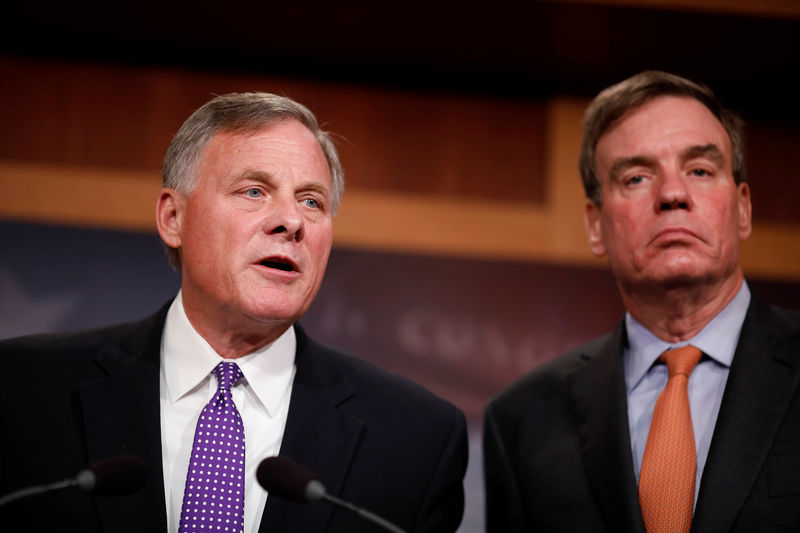By Patricia Zengerle
WASHINGTON (Reuters) - Leaders of the U.S. Senate Intelligence Committee said on Wednesday the issue of whether President Donald Trump's 2016 election campaign colluded with Russia remains an open question as the panel intensifies its probe into the matter.
Republican Chairman Richard Burr and Democratic Vice Chairman Mark Warner also warned about the risk to future U.S. elections posed by Russia, including what is expected to be a closely contested election next month for governor of Warner's home state, Virginia.
Burr told reporters the committee plans to conduct 25 more interviews with witnesses this month, but described his goal of finishing this year the main congressional investigation into Russian meddling as only "aspirational" at this point.
"The issue of collusion is still open," Burr said, standing alongside Warner at a press conference to provide an update on the investigation. "We have not come to any determination on collusion," he said.
Burr said he wanted very much to conclude the investigation before the height of campaigning for November 2018 U.S. mid-term elections, when all 435 seats in the House of Representatives and one third of the 100-seat Senate will be up for grabs.
Warner said the United States needed a "whole-of-government" approach to combating interference with U.S. elections. "The Russian active measures efforts did not end on Election Day,
2016," he said.
Trump, who has called allegations of campaign collusion with Moscow a hoax, has faced questions about the matter since he took office in January. A special counsel appointed by the Justice Department, Robert Mueller, is conducting a separate probe that could lead to criminal charges.
Russia denies meddling.
U.S. intelligence agencies concluded that Russia interfered in the election to try to help Trump defeat Democratic candidate Hillary Clinton through a campaign of hacking and releasing embarrassing emails, and disseminating propaganda via social media to discredit her campaign.
Burr said the committee agreed with the intelligence community's conclusion that Russia had interfered.
"The committee continues to look into all evidence to see if there was any hint of collusion," Burr said. "Now, I'm not even going to discuss initial findings because we haven't any. We've got a tremendous amount of documents still to go through."
100 INTERVIEWS, 250 HOURS
He said the panel has conducted more than 100 interviews lasting more than 250 hours in its nine-month-old probe, and "we currently have booked for the balance of this month 25 additional interviews."
Those who have already come before committee members or investigators include the president's son-in-law and adviser Jared Kushner, former Trump campaign manager Paul Manafort, and social media executives such as officials from Twitter Inc (N:TWTR).
On Wednesday, a representative for Kushner and Ivanka Trump denied a report in USA Today that the couple had re-routed personal emails through their family's business.
Among witnesses who will appear at future public committee hearings are Trump's personal attorney, Michael Cohen, and executives from Facebook Inc (O:FB), Twitter and Alphabet Inc's (O:GOOGL) Google.
Warner and Burr urged American election officials and political campaigns to take the threat of Russian interference seriously.
"You can't walk away from this and believe that Russia's not currently active in trying to create chaos in our election process. And I assume that the same tactics that you saw in Montenegro, in France, in Belgium and in the United States will continue to be tested within our structure of the election process," Burr said.
Burr said the committee has "hit a wall" in its investigation of a former British spy's explosive dossier on purported Russian support for Trump's 2016 campaign.
Former MI6 officer Christopher Steele compiled the dossier, which Trump was told by former FBI director James Comey contained salacious material about the businessman-turned-president. Trump and his associates have called the dossier's contents false.
"We have, on several occasions, made attempts to contact Mr. Steele, to meet with Mr. Steele," Burr said.
"Those offers have gone unaccepted. The committee cannot really decide the credibility of the dossier without understanding things like who paid for it, who are your sources and sub-sources," Burr added.

(This corrected version of the story removes quote with incorrect attribution in sixth paragraph, replacing with another quote).